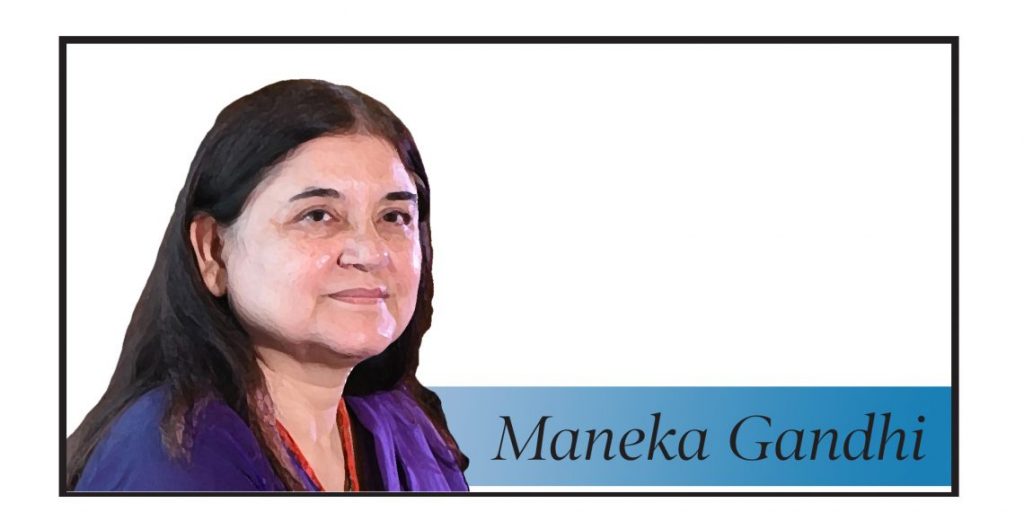Five years ago, I requested the Head of the Bar Council of India to get animal welfare introduced as a subject in the law colleges. He did it immediately. The result has been much more sensitive and informed lawyers, an annual moot court that is hosted by NLU Bangalore, PhDs in animal welfare (the first one was in NLU Cuttack), more people aware of animal welfare activism and far more sensitive judges. A big thank you to Manan Kumar Mishra!
Twenty-two years ago, at the instance of AtalBehari Vajpayee, who supported all new ideas, we built the National Institute for Animal Welfare in Ballabgarh. Unfortunately, the government fell when it was ready. The Congress shut it down, and now the BJP is in its 7th year without restarting it. The Minister for Environment gave it to JNU. They fooled around for two years and then returned it to the Ministry, who slept on it for two years and then handed it to LalaLajpatRai University of Veterinary and Animal Sciences, who have ignored it for three years and only now have appointed a retired vet to make a course. I have lost all hope. In 2002, I wrote out all the courses, made some textbooks, contacted Oxford, Cambridge and the University of Edinburgh, for teachers, got a Grant from the UNEP for the library. But nothing has happened and nothing ever will. The magnificent 7 acre centre now houses 10 people of the Animal Welfare Board of India and runs ‘awareness’ courses of three days each for the student vets of LUVAS.
But there are huge job opportunities for trained animal welfare people: shelter managers, gaushala managers, laboratory managers, forest and wildlife officers, city management of animals, elephant rescue centres, city snake rescuers, poultries, slaughterhouses, to begin with and hundreds of others. I simply cannot understand why it has taken so long for even one course to begin.
A huge thank you to the Vice Chancellor of IGNOU, Prof. NageshwarRao, and to Professor PVKSasidhar, for starting the first degree related course in India for animal welfare. Prof. Sasidhar has been labouring at the modules for over three years now. The first session itself has over 800 students!
It is a PG Diploma in Animal Welfare (PGDAW) and the admissions are open for the January 2021 Session. The Online Admissions Link: www.ignouadmission.samarth.edu.in/.
The PGDAW programme is meant for animal welfare volunteers and professionals across India, and for graduates / post-graduates interested in studying animal welfare. I have seen the learning module and I like it. I wish I had been able to compile the 3000+ articles I have written on every aspect of animal welfare. They could have been part of the course. But my editor has been fooling around with the 7 volume compilations for 5 years now, and I have no idea when she will be done. National Book Trust had offered to print them all, but not even the first volume is ready.
The IGNOU course has four core components: Animal welfare science and ethics, Animal welfare issues, Animal welfare laws and policies, and Animal welfare practices and standards.
Animal welfare is concerned about the welfare of all animals that are managed in some way by humans. Farm animal welfare means the care of animals grown for milk and meat, and that is where animals suffer the most.
Welfare issues, pertaining to working, performing, companion, zoo, lab and street animals, need a great deal of attention as well. The PGDAW programme, in 85 modules, has covered welfare, science, ethics, issues, laws and standards, of all farm and draught animals – cattle, buffaloes, sheep, goats, pigs, poultry, working animals like donkeys and horses, performing animals, pets, zoo and lab animals. These modules have been developed in collaboration with The Jeanne Marchig International Centre for Animal Welfare Education, University of Edinburgh, UK.
It’s a one year course, and graduates from any discipline can take it. It has two objectives: To impart science based animal welfare education through open and distance learning. To build the capacities of stakeholders to take socially responsible decisions concerning animal welfare. The total fee of the course is Rs 5,400.
Who should take this course: Obviously all young people interested in animals, Employees Working in Animal Welfare Organisations / NGOs / Gaushalas, Faculty, Researchers, Technical Staff & PG / PhD Students in Universities, Research Organisations and Veterinary Colleges, Veterinarians / Para-veterinarians in State / Central Government / RVC & Para-Military Forces, Members of State Animal Welfare Boards / SPCAs, Members of CPCSEA / Institutional Animal Ethics Committees /Animal House Facilities, Civil Servants, Officials and Researchers Working in Forest Departments, Zoos and Wild Life Institutes, Faculty and Research Scholars under Zoological Survey of India and Zoology Departments, Law Professionals and Police Personnel dealing with Animal Welfare Laws and their Enforcement, Graduates Seeking Career as Animal Welfare Professionals.
Ideally, I would make it compulsory for all schools – if we want a better India.
The Programme Coordinator, Prof. PVK Sasidhar, School of Extension and Development Studies, IGNOU, New Delhi (e-mail: pvksasidhar@ignou.ac.in), has great credentials himself. He has been in the Agricultural Research Service of ICAR (2003-09), a Norman Borlaug Fellow of USDA, Tuskegee University, USA (2008), USAID Fellow, Michigan State University, USA (2015), and an OIE Performance of Veterinary Services Evaluator, OIE (2018).
If you want to join this, now is the time. Also, if you have suggestions to make it better, write to the Professor. I would recommend it for activists in Sri Lanka and Nepal as well, as the issues are the same.
To join the animal welfare movement contact gandhim@nic.in, www.peopleforanimalsindia.org
